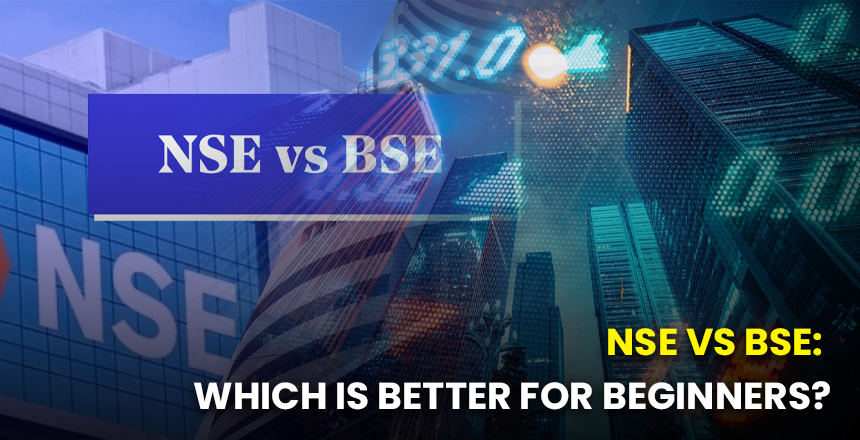Introduction
In starting the way into the stock market, the very first thing that new investors encounter is the introduction to both NSE vs BSE . Both stock and security exchanges differ from one another based on aspects of their liquidity, volume of trading, types of investments made, and accessibility; the two are also a platform where you can trade with different equity indices.
For the beginner wanting to understand NSE vs BSE better, then this blog would help the reader understand the key differences and advantages-disadvantages to decide the better option.
What is NSE?
National Stock Exchange (NSE) Overview
The National Stock Exchange is the market’s largest stock exchange in India. Established in 1992 and became operational by 1994. NSE was founded to introduce electronic trading as an alternative to the traditional open outcry. A high level of liquidity, speed at which trades can be executed, and exhaustive derivation trading are the hallmarks of the NSE.
Some Important Features of NSE
Index: NIFTY 50 (the benchmark index representing the top 50 companies).
Market Share: Higher volume trading was done daily compared to that from BSE.
Electronic Trading: The first fully automated screen-based trading system in India.
Liquidity: A very liquid market where buying and selling stocks may be done quickly.
The most popular among traders: Most intraday traders, as well as derivatives investors, prefer the market because of its tight spreads and speed of execution.
What is BSE?
1. Bombay Stock Exchange (BSE) Overview
The World Federation of Exchanges recognizes BSE as the oldest stock exchange in Asia in terms of its establishment in 1875, while having a long history before it adopted electronic trading in 1995. It is home to numerous listed companies and yet comparatively has a lower trading volume than that of NSE.
Major Characteristics of BSE
Index: SENSEX (Benchmark index of the top 30 companies).
Market Share: Has lower trading volume when compared to NSE.
Listing Companies: Longevity over 5,500; highest in India.
Investment Applicability: This is best suited for long-term investors and beginners as it is less volatile.
Bond & SME Investments: There BSE is more on small-caps and bond trading.
Key Differences Between NSE vs BSE
| Criteria | NSE | BSE |
| Founded | 1992 | 1875 |
| Benchmark Index | NIFTY 50 (Top 50 companies) | SENSEX (Top 30 companies) |
| Market Capitalization | Higher | Slightly lower |
| Liquidity | High (More traders and institutions) | Moderate |
| Trading Volume | Highest in India | Lower than NSE |
| Derivatives Trading | Extensive options | Limited options |
| Investment Focus | Short-term trading, intraday, F&O | Long-term investing, bonds, SMEs |
| Ideal For | Traders & active investors | Beginners & passive investors |
NSE vs BSE: Which is Better for Beginners?
1. Liquidity & Trade Execution Speed
It’s how easily or quickly you can buy and sell shares without changing the cost of that stock into a very short-term time frame value. However, because of the higher trading volumes on the NSE, the trade will be executed at its quickest speed.
For a newbie: If you’re looking for a quick trade execution, the NSE is the way to go.
2. Availability & Variety of Stocks
However, it has about 5,500+ stocks listed on BSE, and to some degree, local stocks are more active in terms of trade, which assures you a better price stability.
Beginners: For those looking for a wider variety of investment options, BSE becomes a better one.
3. Price Fluctuation & Stability
NSE stocks are known to be volatile, therefore they are suitable for day trading and short-term investments.
BSE stocks, on the other hand, are more stable and thus can be regarded as suitable for investments of a longer period.
For new people: If what you want is a low-risk investment environment, BSE is the safer choice.
4. Transaction Costs and Brokerage Charges
Stock exchange determines the brokerage charges for each trade. A few brokers might even lower their charges for the trades made on NSE owing to the high liquidity present in the markets.
Beginners: Compare brokerage charges before selecting for trading on an exchange.
5. Trading in Derivatives and Futures
If you are interested in Futures & Options (F&O) trading, then NSE should be your first choice, for it runs the most extensive derivatives segment.
Beginners: For new traders, try equity stocks at BSE before derivatives.
Pros and Cons of NSE vs BSE
Advantages of NSE
Greater liquidity facilitates speedier trade execution. The same is excellent for intraday trading and traders interested in F&O trading. More institutional investors are coming in to ensure price stability. Online trading infrastructure has improved even further, with real time data access. Drawbacks Of NSE They excite great risk with high volatility; Not so many securities as BSE.
Benefits of BSE The maximum number of listed firms proffers a variety of investment options. Less volatile, hence, friendly most probably for beginners. The best for investors who want to invest for the long term with a steady-growth stock. Heavily invested on bonds and SME investment platforms. Drawbacks of BSE Have relatively lower liquidity, which might cause a delay in execution of trades. Not so good for derivatives and short-term trading.
Which Stock Exchange Should Beginners Choose?
NSE vs BSE: Which is Better for Beginners?
✅ BSE – because here risk taking comes with more stable stocks.
Ideal for long-term investments and portfolio construction.
Good for direct IPOs, as well as small-cap stock investments.
For beginners interested in active trading and short-term profits:
✅ NSE – Liquidity and speed with which you can execute your trade are superior here.
Best under intraday to derivatives (F&O).
It best suits traders comfortable with marketwide movement.
How to Start Trading on NSE & BSE?
Once you are ready for stock investment in India, follow these steps:
Open a Demat & Trading Account – Pick a SEBI-registered broker like Zerodha or Upstox or Grow for executing trades.
Choose Stocks Wisely – Start with those stable and well-performing large-cap stocks.
Use Limit Orders for Trading – Set fixed buy/sell prices to avoid price oscillations.
Read financial news, watch share fluctuations, and track how companies are performing through numbers to understand market trends.
Diversify Your Portfolio – Do not put all your eggs in one basket; invest across sectors to reduce risk.
Start Small, Learn and Grow- Do not get into high-risk investment strategies initially but gradually bring them into play.
Conclusion
Well, which is the better one for a beginner: NSE vs BSE? The answer entirely depends upon your investment objectives as:
– For quick trades with high liquidity and derivatives trading, NSE is your best option.
–
– Whereas BSE is all about having a wide range of stocks, stability, and long-term investing.
-Beginners should start with BSE for safer investments and move to NSE for active trading as they gain experience. However, regardless of the above, knowing the trends in the market, risk management, and the diversification of a portfolio are important in making a successful investment.








